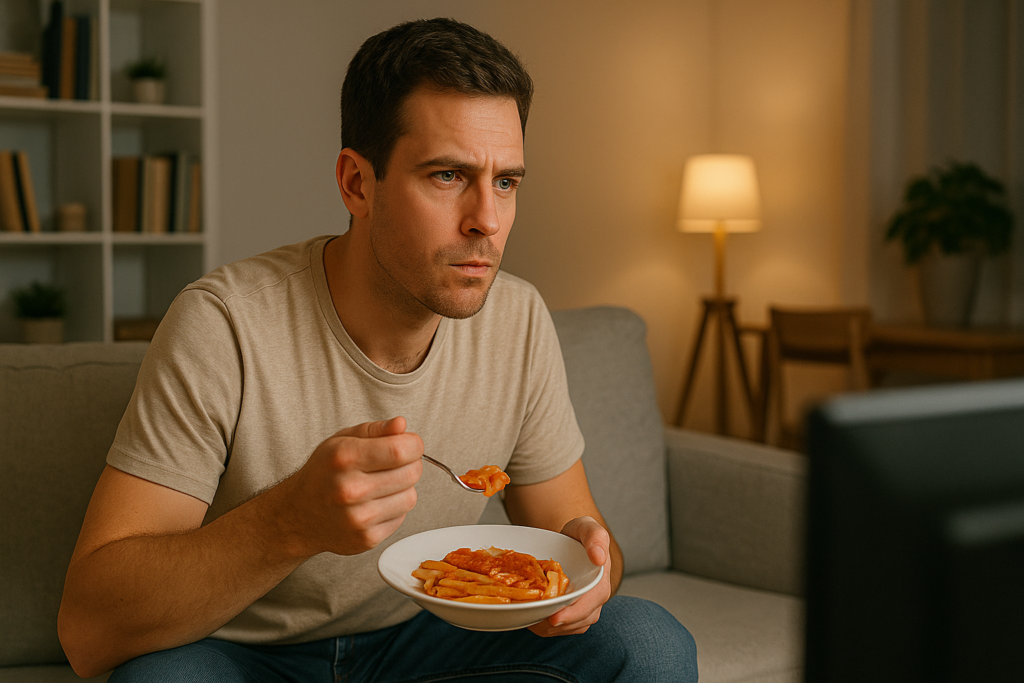I used to think “TV dinners” were a relic of 1950s suburbia—cardboard trays, canned peas and a family glued to I Love Lucy. Then I became a chronically busy entrepreneur. Some nights I found myself in my Saigon apartment, plate balanced on my knees, Netflix murmuring in the background, and not another soul in sight.
That harmless‑looking habit led me down a psychological rabbit hole. Why do some of us actively prefer eating alone in front of a screen? And what does it say about our inner wiring?
Below are seven personality traits that research—and a dash of Buddhist insight—suggest are common among solo TV‑diners. They’re not judgments. Think of them as mirrors we can hold up to better understand our needs, strengths and blind spots.
1. A strong streak of independence
People who routinely choose solo, screen‑side suppers often score high on independence.
A Swedish qualitative study found that older adults who regularly ate alone described the practice as an extension of their “individualistic lifestyle,” not a sign of social failure.
Dining became “me‑time”—an activity entirely under their own control.
2. Comfort with solitude (but susceptibility to loneliness)
Eating alone doesn’t automatically equal loneliness, yet research shows it can predict it when the arrangement becomes habitual.
A large Japanese cohort study reported that men and women who ate alone were significantly more likely to meet criteria for depressive symptoms—even after controlling for living situation.
Mindfulness invites us to sit with solitude without letting it harden into isolation.
If your nightly ritual feels nourishing—great. If it leaves a quiet ache once the show ends, that’s a cue to sprinkle some face‑to‑face meals back into the week.
3. A need for steady sensory stimulation
From a brain standpoint, the television isn’t mere background noise—it’s a second stream of dopamine.
Experimental studies show that watching TV while eating dulls memory of the meal and increases total calorie intake. Our attention flips between fork and flashing pixels, so satiety signals arrive late.
People who rely on that extra layer of stimulation often have novelty‑seeking temperaments.
They like multiple inputs—the sizzle of the stir‑fry and the plot twist.
In moderation, that trait fuels creativity. Unchecked, it feeds mindlessness.
4. Lower moment‑to‑moment self‑control around food
Personality research links impulsiveness and low self‑discipline with “external eating”—consuming food in response to sights and sounds rather than hunger.
TV amplifies those external cues: a burger ad appears and suddenly your leftover bánh mì seems inadequate.
Rather than labeling ourselves “weak,” we can borrow the Buddhist tool of sati (remembering).
Place utensils down between bites, switch off autoplay, or simply notice the urge arise and pass. Each micro‑pause rebuilds the self‑control muscle.
5. Pragmatic multitaskers who prize efficiency
A seven‑day time‑use study found that eating and TV viewing “frequently co‑occur, irrespective of demographic characteristics.”
In other words, it’s the ultimate two‑for‑one: nourish the body while catching up on Succession.
Efficiency lovers treat dinner as another checkbox in an optimized evening. The payoff is saved time; the cost can be diminished presence.
6. A tendency to self‑soothe with food‑plus‑media
Psychologists call TV a “social surrogate” that momentarily reduces feelings of rejection or stress.
A study in Appetite found that comfort foods taste better when people are alone because they symbolically “bring loved ones to the table.”
If you gravitate toward warm noodles and light comedy after a bruising day, you’re probably high in emotional‑sensitivity traits.
That empathy can be beautiful, but the Buddha cautioned against trishna—craving as a blanket for discomfort.
Swapping one weekly TV meal for a phone call or mindful breathwork can offer the same comfort minus the empty calories.
7. Non‑conformist confidence (low fear of social judgment)
Dining solo in public—or even privately rejecting the “family dinner” ideal—signals a willingness to buck social norms.
Experimental consumer‑behavior research shows that people’s intention to eat alone drops sharply when they anticipate negative evaluation from others; those who still choose it report lower concern about external judgment.
Such self‑assurance aligns with Buddhism’s teaching of non‑attachment to praise or blame.
The flip side? Without periodic feedback from loved ones, our habits can calcify. True confidence stays open to gentle reality checks.
Bringing it all together
Put these seven traits on a mandala and you’ll notice a paradox: solo TV‑diners are simultaneously independent and emotionally attuned, efficient and impulsive, self‑assured and susceptible to loneliness. In Buddhist terms, they are living koans—reminders that human qualities inter‑are.
So what now? If the nightly ritual leaves you satisfied, keep savoring it—mindfully. If you recognize some shadow sides (mindless nibbling, creeping isolation), experiment with tiny shifts:
- Plate your food before pressing play.
- Schedule one screen‑free meal with a friend each week.
- Watch the first ten minutes of your show after you’ve finished eating to strengthen meal memory and fullness cues.
Finally, remember that personality traits aren’t prison cells; they’re garden beds. With awareness and compassionate tweaking, even a humble TV dinner can become a practice in balanced living—one bite, one breath, one episode at a time.
















